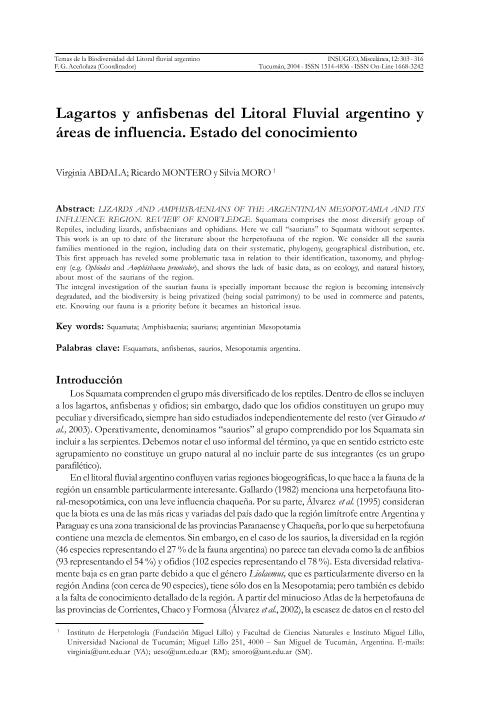Artículo
Squamata comprises the most diversify group of Reptiles, including lizards, anfisbaenians and ophidians. Here we call .saurians. to Squamata without serpentes. This work is an up to date of the literature about the herpetofauna of the region. We consider all the sauria families mentioned in the region, including data on their systematic, phylogeny, geographical distribution, etc. This first approach has reveled some problematic taxa in relation to their identification, taxonomy, and phylogeny (e.g. Ophiodes and Amphisbaena prunicolor), and shows the lack of basic data, as on ecology, and natural history, about most of the saurians of the region. The integral investigation of the saurian fauna is specially important because the region is becoming intensively degradated, and the biodiversity is being privatized (being social patrimony) to be used in commerce and patents, etc. Knowing our fauna is a priority before it becames an historical issue. Los Squamata comprenden el grupo más diversificado de los reptiles. Dentro de ellos se incluyen a los lagartos, anfisbenas y ofidios; sin embargo, dado que los ofidios constituyen un grupo muy peculiar y diversificado, siempre han sido estudiados independientemente del resto (ver Giraudo et al., 2003). Operativamente, denominamos saurios al grupo comprendido por los Squamata sin incluir a las serpientes. Debemos notar el uso informal del término, ya que en sentido estricto este agrupamiento no constituye un grupo natural al no incluir parte de sus integrantes (es un grupo parafilético).
Lagartos y anfisbenas del litoral fluvial argentino y áreas de influencia. Estado del conocimiento.
Título:
Lizards and amphisbaenians of the argentinian mesopotamia and its influence region. Review of knowledge
Fecha de publicación:
12/2004
Editorial:
Instituto Superior de Correlación Geológica (Conicet)
Revista:
Misceláneas del Instituto Superior de Correlación Geológica
ISSN:
1514-4275
Idioma:
Español
Tipo de recurso:
Artículo publicado
Clasificación temática:
Resumen
Archivos asociados
Licencia
Identificadores
Colecciones
Articulos(CCT - NOA SUR)
Articulos de CTRO.CIENTIFICO TECNOL.CONICET - NOA SUR
Articulos de CTRO.CIENTIFICO TECNOL.CONICET - NOA SUR
Citación
Abdala, Virginia Sara Luz; Montero, Ricardo; Moro, Silvia; Lagartos y anfisbenas del litoral fluvial argentino y áreas de influencia. Estado del conocimiento.; Instituto Superior de Correlación Geológica (Conicet); Misceláneas del Instituto Superior de Correlación Geológica; 12; 12-2004; 303-326
Compartir




